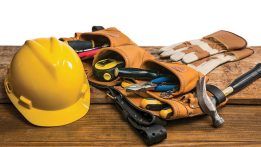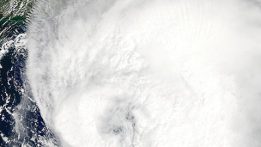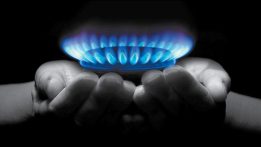This time of year is synonymous with spring cleaning. As you roll up your sleeves, the trash and clutter filling your house and garage goes to the curb. Before filling your barrel, take a second glance to make sure that your garbage is not actually household hazardous waste, which requires extra caution when being discarded.
Household hazardous waste is classified as any form of waste that poses a threat to human health and/or the environment. These items can be flammable, corrosive, reactive or toxic. Many common household products, such as herbicides, solvents and paints, are considered household hazardous waste because they cause serious impacts if they’re improperly disposed of through the garbage or drain.
It might surprise you to learn that there are many common household items that are considered hazardous. Some of these include:
Batteries
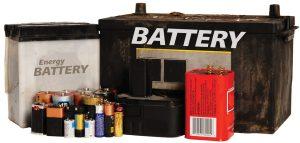 When batteries are tossed in the trash and dumped in our landfills, they can crack, decay or leak, releasing toxic chemicals into our soils and ground surface waters. All batteries from small, triple-A batteries to large vehicle batteries should be properly disposed of at a hazardous waste center. Some local automotive parts stores will also accept old vehicle batteries as well.
When batteries are tossed in the trash and dumped in our landfills, they can crack, decay or leak, releasing toxic chemicals into our soils and ground surface waters. All batteries from small, triple-A batteries to large vehicle batteries should be properly disposed of at a hazardous waste center. Some local automotive parts stores will also accept old vehicle batteries as well.
E-Waste
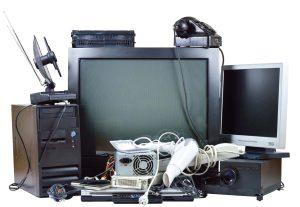 Electronic waste (e-waste) is defined as discarded electronic devices and/or used electronics that are destined for reuse, resale, salvage, recycling or disposal. The best way to identify e-waste is anything with a battery or cord that you would like to get rid of. Examples of e-waste include cell phones, computer monitors, desktop computers, DVD players, laptops and radios – just to name a few. Many of these items contain toxic metals and corrosive chemicals. Most also contain lithium batteries, which can cause dangerous fires in sanitation trucks. E-waste can be recycled at Goodwill Donation Centers and disposed of through local electronic stores and hazardous waste centers.
Electronic waste (e-waste) is defined as discarded electronic devices and/or used electronics that are destined for reuse, resale, salvage, recycling or disposal. The best way to identify e-waste is anything with a battery or cord that you would like to get rid of. Examples of e-waste include cell phones, computer monitors, desktop computers, DVD players, laptops and radios – just to name a few. Many of these items contain toxic metals and corrosive chemicals. Most also contain lithium batteries, which can cause dangerous fires in sanitation trucks. E-waste can be recycled at Goodwill Donation Centers and disposed of through local electronic stores and hazardous waste centers.
Fluorescent Light Bulbs
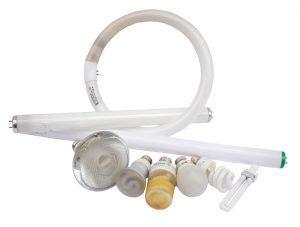 Energy-efficient CFL light bulbs contain the chemical mercury. The Environmental Protection Agency (EPA) recommends that CFLs, fluorescent bulbs and other bulbs that contain mercury be taken to qualified recycling and hazardous waste centers for disposal. It is never recommended that bulbs be thrown out with the trash. Mercury can have toxic effects to the nervous, digestive and immune systems, and broken bulbs can seriously injure sanitation crew members.
Energy-efficient CFL light bulbs contain the chemical mercury. The Environmental Protection Agency (EPA) recommends that CFLs, fluorescent bulbs and other bulbs that contain mercury be taken to qualified recycling and hazardous waste centers for disposal. It is never recommended that bulbs be thrown out with the trash. Mercury can have toxic effects to the nervous, digestive and immune systems, and broken bulbs can seriously injure sanitation crew members.
Pharmaceuticals and Medical Supplies
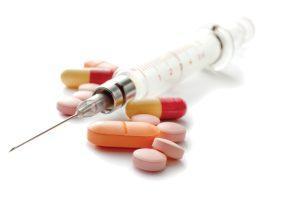 Many people are tempted to flush unwanted prescriptions and over-the-counter medications down the drain. This, however, contaminates our lakes and streams, which can hurt fish and other aquatic life. Plus, these medications can end up in our drinking water as they enter our wastewater treatment system. Medical needles and syringes (sharps) need special care for disposal as well. The Tallahassee Police Department accepts medicines and pills in a double ziplocked bag, and the Leon County Health Department accepts sharps for proper disposal.
Many people are tempted to flush unwanted prescriptions and over-the-counter medications down the drain. This, however, contaminates our lakes and streams, which can hurt fish and other aquatic life. Plus, these medications can end up in our drinking water as they enter our wastewater treatment system. Medical needles and syringes (sharps) need special care for disposal as well. The Tallahassee Police Department accepts medicines and pills in a double ziplocked bag, and the Leon County Health Department accepts sharps for proper disposal.
Pressurized Containers
 Pressurized containers and aerosol cans are filled with compressed gas. Typically, household products like spray paint, hair spray, insect repellent and room deodorizers are packaged in these types of containers. When completely empty, these containers can be recycled as steel cans. If partially full, then they are treated as hazardous waste. Unemptied pressurized containers can cause major damage if thrown in the garbage. These containers can explode, releasing gases that react with other materials in sanitation trucks and possibly lead to fires.
Pressurized containers and aerosol cans are filled with compressed gas. Typically, household products like spray paint, hair spray, insect repellent and room deodorizers are packaged in these types of containers. When completely empty, these containers can be recycled as steel cans. If partially full, then they are treated as hazardous waste. Unemptied pressurized containers can cause major damage if thrown in the garbage. These containers can explode, releasing gases that react with other materials in sanitation trucks and possibly lead to fires.
Each year, the City of Tallahassee hosts two Cash for Trash events, where residential utility customers with an active garbage service account can receive a $5 credit toward their utility bill for turning in their unwanted household hazardous waste and bulky items. These events take place each fall and spring at the Solid Waste Services facility, located at 2727 Municipal Way.
If you have a question about what items constitute household hazardous waste and where to dispose of them properly, visit Talgov.com. In most cases, household hazardous waste can be taken to the Leon County Solid Waste Facility, located at 7550 Apalachee Parkway, for proper processing.
Improperly disposing of household hazardous waste can be detrimental to our community. It’s up to all of us to do our part in keeping our city clean. By knowing which items are household hazardous waste and properly disposing of them, we can ensure the cleanliness of our community and our environment – helping to keep Tallahassee a place we all love to call home. ![]()
Heather Teter
City of Tallahassee


